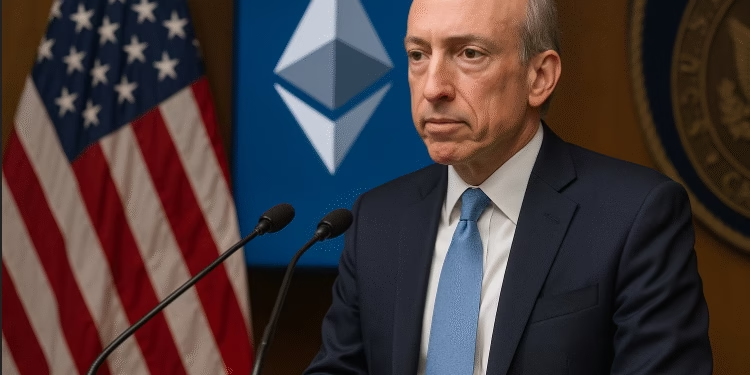The United States is “probably 10 years behind” in developing a comprehensive crypto regulatory framework, according to newly appointed SEC Chair Paul Atkins, who pledged Wednesday that closing that gap is now the agency’s top priority.
Speaking at DC Fintech Week, Atkins said building clear crypto rules to attract innovators back to the US is “job one” for the SEC, marking a significant policy shift from the agency’s previously adversarial stance toward digital assets.
“The crypto aspect is our job one,” Atkins said during his remarks. “The SEC aims to build a strong framework to actually attract people back into the United States who may have fled.”
Atkins emphasized that the agency’s approach would seek to balance investor protection with innovation.
“I like to say that we’re the securities and innovation commission now,” he added.
The comments come at a time when global competitors—from Europe to Asia—have made significant progress in defining clearer rules for digital assets, while the US regulatory environment remains fragmented and uncertain.
Exemptions could fuel innovation
In elaborating on the SEC’s priorities, Atkins underscored that developing an effective crypto regulatory framework forms part of the agency’s broader “embrace of innovation.” He revealed that the SEC is “working full-time on crypto regulation,” signaling a shift toward a more proactive posture.
Atkins hinted at introducing what he called an “innovation exemption” — a flexible legal provision that could allow emerging crypto projects to test new concepts without falling foul of rigid rules.
“We at SEC with respect to our statutes have pretty broad authority for exemptions to be made,” he said. “And so I think we can be, you know, very forward-leaning in that in order to accommodate new ideas.”
The potential for such exemptions, if formalized, could position the US to compete with jurisdictions like Singapore and the United Kingdom, where regulatory sandboxes have successfully attracted fintech startups. The crypto regulatory framework Atkins described appears to echo those global models, emphasizing experimentation under oversight rather than blanket prohibition.
The case for superapps in the US financial ecosystem
Atkins also spoke about the growing global interest in “superapps” — platforms that merge payments, investments, and financial services into one user-friendly interface. He argued that these integrated platforms could thrive under a well-structured crypto regulatory framework.
He referenced the success of Asian tech giants like WeChat, which have seamlessly integrated financial tools into daily life. Atkins suggested that the US could replicate similar successes if its regulators adopt a forward-thinking approach.
“Thinking about the regulatory coordination as an app in and of itself is very clever,” Atkins said. He proposed that such coordination could help unify oversight among multiple US agencies, which currently operate under differing mandates.
While no American firm has yet developed a true financial superapp, Atkins’ remarks signal a growing recognition within the SEC that regulatory modernization — including a consistent crypto regulatory framework could pave the way for such innovations.
A path to restoring US leadership in digital finance
Atkins’ renewed commitment to crypto oversight marks a shift from previous SEC positions that were often viewed as adversarial toward the industry. By prioritizing the crypto regulatory framework, the chair hopes to restore confidence among innovators and investors who have turned to more predictable foreign markets.
He stated that the SEC’s mission now includes not only protecting investors but also fostering technological advancement.
“Building a strong framework to attract innovation is central to that mission,” he reiterated.
As policymakers in Washington continue to debate the scope of digital asset regulation, Atkins’ remarks highlight an emerging consensus: that without a coherent crypto regulatory framework, the United States risks ceding financial innovation to global competitors.
The chair’s “job one” initiative thus represents more than just a bureaucratic reform, it signals a bid to reclaim the nation’s leadership in the fast-evolving crypto economy.












